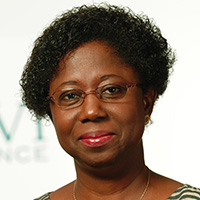
Mercy Ahun
GAVI’s Special Representative to GAVI Eligible Countries
I am delighted to participate to the European Development Days (EDD), Europe’s premier forum on international affairs and development cooperation organised by the European Commission.
It is a landmark event in the development calendar and an important opportunity to share knowledge and experiences with European development practitioners and partners worldwide. It is also a major opportunity to discuss what works and what does not work on the ground without losing sight of the fact that millions of mothers, kids and families rely on our work to have a better life. Together with all stakeholders, we will examine solutions to shared problems in order to achieve a Decent Life for all by 2030, as this year's EDD sheds light on the post-2015 development agenda.
One of the next decade’s challenges will be non-communicable diseases and, more specifically, cancer. Vaccines play a critical role in preventing the infections that cause certain cancers like liver and cervical cancers. The prevention of the infectious causes of cancer through hepatitis B and human papillomavirus (HPV) vaccines can help fight the rising global burden of cancer deaths.
Since 2001, the GAVI Alliance has supported the immunisation of 360 million infants against hepatitis B in the poorest countries of the world. Ghana, my country, recently started to protect girls against cervical cancer with GAVI-supported HPV vaccines.
When I was in charge of the Expanded Program on Immunization in Ghana, I saw the urgent need to make girls and women’s health a priority. Cervical cancer now kills as many women as childbirth, claiming a life every two minutes in some countries. More than 85% of them happen in low-income countries, where infections are higher and fewer women have access to screening and treatment. Without changes in prevention and control, cervical cancer deaths are expected to increase to 430,000 each year by 2030, virtually all in developing countries.
Sweden hosted GAVI’s Mid-Term Review a few weeks ago where key results were highlighted: the Alliance is on course to reach its mission target of immunising an additional 243 million children between 2011 and 2015. By 2014, all 73 GAVI-supported countries will have introduced the 5-in-1 pentavalent vaccine, including Haiti, Myanmar, Somalia and South Sudan.
It would not have been possible without The European Union. The GAVI Alliance and the European Institutions have worked hand in hand to ensure leadership in global health issues and help achieve MDG 4. From 2003 to 2012, the European Institutions have contributed to financing vaccines introductions in GAVI-eligible African Caribbean Pacific (ACP) states with other donors. Moreover, 10 European Union member states are GAVI donors, seven of which are among the top 10 GAVI donors. Most of them provide long-term predictable funding, thereby enabling effective market-shaping and sustainable routine immunisation programmes in the ACP states and beyond.
I would like to thank the European Union at large for its major contribution and I am pleased to see the impact on the ground of taxpayers’ euros. I was recently in Nigeria for the launch of the National Routine Immunisation Strategic Plan and in Cambodia to attend the very important meeting of the GAVI Board. My visits and discussions showed the importance of country ownership in ensuring the sustainability of programmes.
Vaccines offer a giant step forward in the prevention of cancer caused by infectious agents. As research accelerates and technology evolves, new vaccines are on the horizon against other infections associated with cancer bringing the promise of a quiet revolution in cancer prevention. A new development agenda cannot be built without immunisation that leads to a healthy future for all nations.
